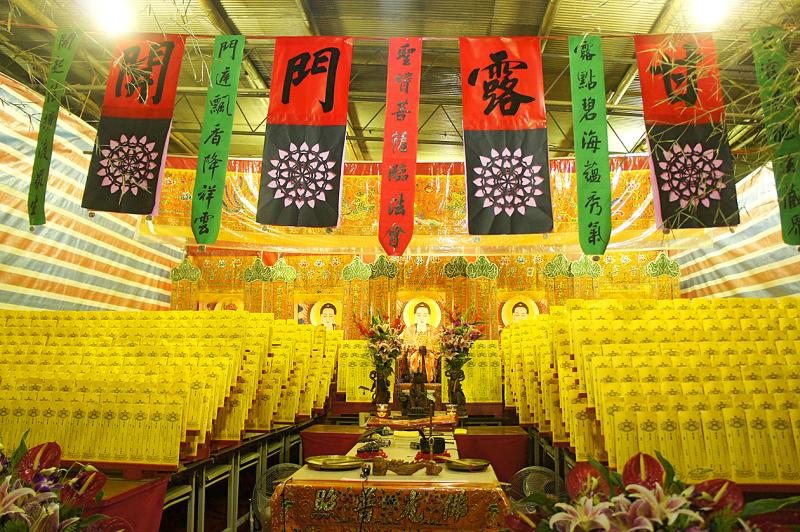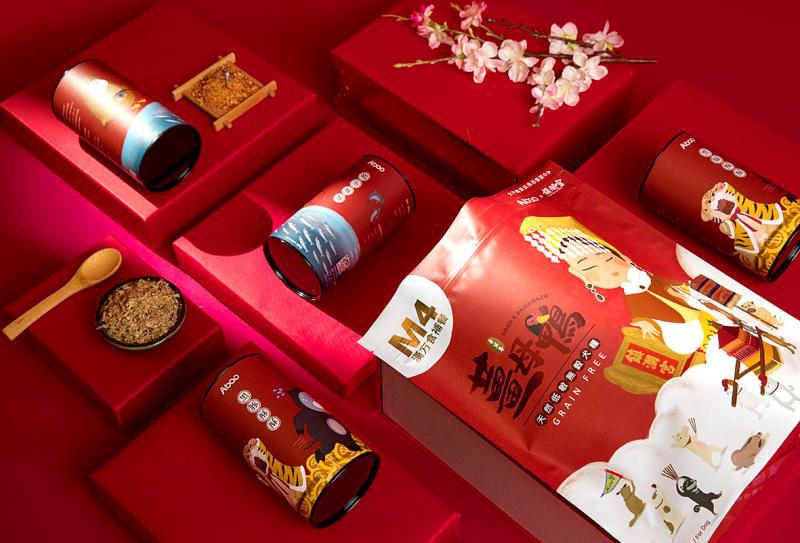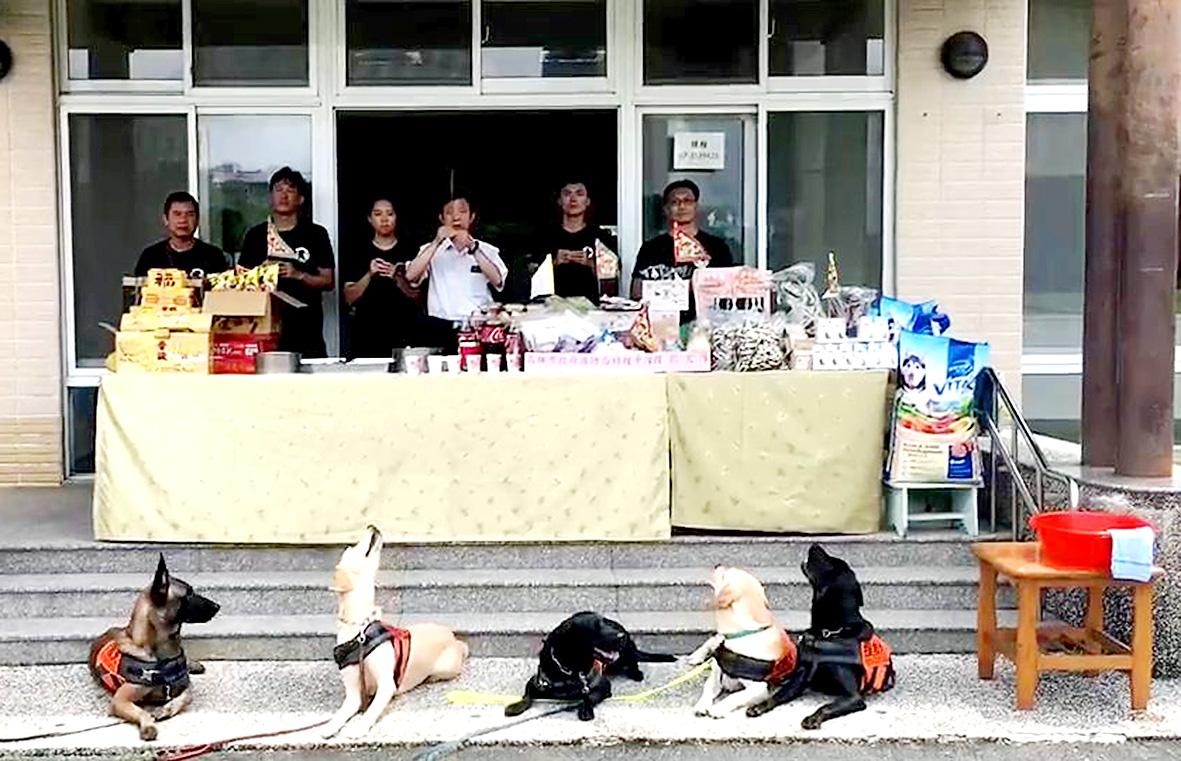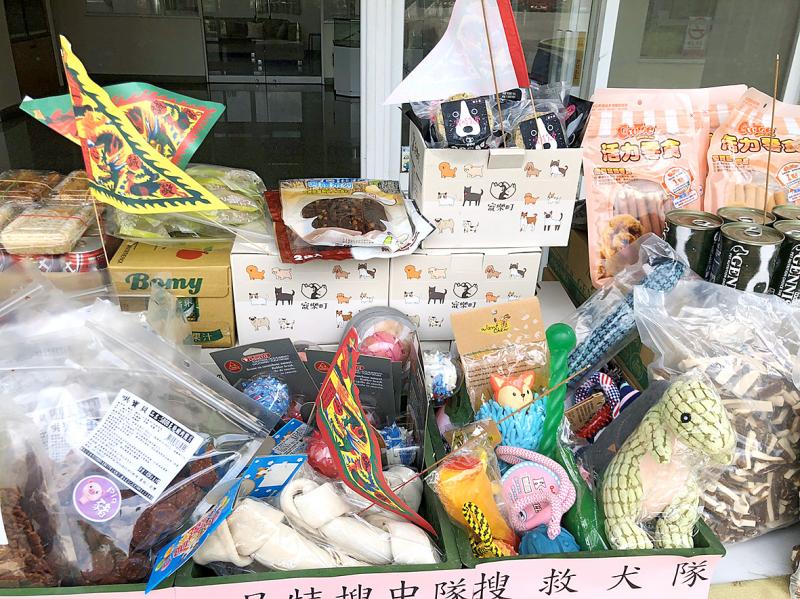While many in Taiwan are buying fruit, snacks and instant noodles this week to feed the hungry ghosts for Sunday’s Chung Yuan Festival (中元節), there’s a growing population who are purchasing pet food.
The festival falls on the 15th day of the seventh month of the lunar calendar, also known as Ghost Month, when the door of the underworld opens and the spirits of the dead return to the human realm and partake in the offerings of food, money and goods prepared by family members.
“We’ve been getting a lot of requests over the past five years regarding the spirits of their beloved dogs, cats and other pets,” says Titan Wu (吳孟寰), spokesperson for Taipei’s Xiahai City God Temple (霞海城隍廟). “To these people, the animals are their family. We’ve always included animal souls in our ceremonies, so we didn’t see a problem with that.”

Photo courtesy of Xiahai City God Temple
Many Taiwanese believe in caring for the spirits of their pets. The Liberty Times (Taipei Times’ sister paper) reported last month on a family who kept hearing their beloved dog for days after it died, and only after they held a small ceremony with food offerings was its spirit appeased and the noises stopped.
Traditionally, Taiwanese institutions that work with animals do make the effort to honor their souls during Ghost Month — whether it be a butcher, zoo or research center. But these animals are generally worshipped in bulk under one spirit tablet during the Chung Yuan pudu (普渡) ceremony — only recently have people wanted to individually pay tribute to deceased pets.
Some events, such as the one at the Kaohsiung Animal Protection Office, even have special tables that are lower in height so the animals spirits can more easily reach the offerings.

Photo courtesy of Jenn Lann Temple
Taichung’s iconic Jenn Lann Temple (鎮瀾宮) is offering this service for the first time this year, and people can purchase specially branded, grain-free dog food from their Web site for the festivities. The temple says some traditionalists don’t agree with the practice, noting that unlike humans, animals don’t have formal names and other details and it will be hard to summon their individual spirits.
“But there’s more and more people asking about it, and religion also has to keep up with the trends,” a temple spokesperson tells the Taipei Times.
FROM BUTCHERS TO PET LOVERS

Photos: Huang Hsu-lei, Taipei Times
The pudu ceremony is the highlight of Ghost Month, and is observed by Buddhists and Taoists and those who practice a combination of both. During the event, people provide offerings for their loved ones, while priests recite scriptures and perform rituals to transmute the souls of the dead and absolve their suffering. This not only helps the spirits, but also keeps the human realm safe.
In the early days, before the concept of pets as a member of the family existed, temples mostly offered services for butchers and slaughterhouses. These animal souls were transmuted in bulk — “a batch of cows, a batch of pigs,” Wu says. “They did not have names.”
While there are few slaughterhouses in Taipei these days, Wu says some meat vendors in neighboring Yongle Market still participate in the festivities. They’ve also received requests from butchers in Taoyuan.

Photo: Huang Hsu-lei, Taipei Times
The temple started offering pet services about a decade ago, but Wu says that it has only picked up in the past five years or so. While people can’t attend this year due to the COVID-19 outbreak, he’s seen participants bring their pets’ favorite toys to the temple.
“Pet ownership is increasing in Taiwan, and awareness is also growing on issues such as adoption and treating the animals as a close companion,” Wu says. “It’s the same concept when it comes to humans — we simply hope that the loved ones that we have lost can be happy on the other side.”
Like they do with humans, the priests will take the spirit tablet of the pets and call their names to summon them. Then they throw divination blocks to make sure that the pet’s soul has arrived before proceeding.
The ceremony at the Xiahai City God Temple lasts for five days, and on the final day the spirits board paper ships to paradise. Wu says there will be a ship for each category of deceased — ancestors, unborn children, pets and so on.
PEACE FOR ANIMAL SOULS
While search and rescue or shelter animals aren’t technically pets, staff members also form bonds with them, and some institutions also put on yearly pudu ceremonies.
The search and rescue division at the Kaohsiung City Fire Department, for example, has been performing pudu events for its dogs for the past few years. Since its founding in 2005, the division has lost at least seven dogs during major incidents such as 2009’s Typhoon Morakot and the Tainan building collapse in 2016.
Division chief Chen Chih-san (陳志三) says he first set up a stele for his deceased canine comrades in the kennel in 2017 after seeing their counterparts in Japan do the same.
“Then I thought, why not do a Chung Yuan pudu ceremony?” he says. “I don’t think people really honored working dogs here in the past. In addition to helping the dogs in the afterlife, it also brings comfort to our team members since we all helped raise and train the dogs.”
The ceremony is symbolically led by one of the dogs — last year it was a Malinois named Dan — and the rest all attended to pay tribute to their predecessors. Unfortunately, Chen says they won’t be having an event this year due to the COVID-19 outbreak.
New Taipei City’s Animal Protection Office has also opened its pudu ceremonies to the public in recent years, often collaborating with various animal welfare groups. Last year it even held a Chung Yuan Festival concert for people to pay tribute to their pets. They had planned on another grand event this year, but the pandemic got in the way.
Instead, on Sunday they’ll be collaborating with the Buddhist Fo Guang Shan monastery to transmute the spirits of all the deceased animals in the city, director Yang Shu-fang (楊淑方) says, whether they were killed in accidents, consumed by humans or died peacefully as pets.
In the past, they’ve only focused on the souls of the animals who once lived in the municipality’s eight shelters, but Yang says they feel like doing something more significant to ease people’s minds this year.
“While other city departments are working hard to combat the virus, we also want to do what we can to pray for the safety of the people too,” Yang says. “New Taipei City is the most populous municipality in Taiwan, meaning that people here likely consume a lot more animals. We should try to transmute their souls so that the world becomes more of a calm and peaceful place. The priests will help the animals’ spirits return to the reincarnation cycle so they don’t linger in the world of the living.”

Last week the State Department made several small changes to its Web information on Taiwan. First, it removed a statement saying that the US “does not support Taiwan independence.” The current statement now reads: “We oppose any unilateral changes to the status quo from either side. We expect cross-strait differences to be resolved by peaceful means, free from coercion, in a manner acceptable to the people on both sides of the Strait.” In 2022 the administration of Joe Biden also removed that verbiage, but after a month of pressure from the People’s Republic of China (PRC), reinstated it. The American

Chinese Nationalist Party (KMT) legislative caucus convener Fu Kun-chi (傅?萁) and some in the deep blue camp seem determined to ensure many of the recall campaigns against their lawmakers succeed. Widely known as the “King of Hualien,” Fu also appears to have become the king of the KMT. In theory, Legislative Speaker Han Kuo-yu (韓國瑜) outranks him, but Han is supposed to be even-handed in negotiations between party caucuses — the Democratic Progressive Party (DPP) says he is not — and Fu has been outright ignoring Han. Party Chairman Eric Chu (朱立倫) isn’t taking the lead on anything while Fu

There is a Chinese Communist Party (CCP) plot to put millions at the mercy of the CCP using just released AI technology. This isn’t being overly dramatic. The speed at which AI is improving is exponential as AI improves itself, and we are unprepared for this because we have never experienced anything like this before. For example, a few months ago music videos made on home computers began appearing with AI-generated people and scenes in them that were pretty impressive, but the people would sprout extra arms and fingers, food would inexplicably fly off plates into mouths and text on

Feb 24 to March 2 It’s said that the entire nation came to a standstill every time The Scholar Swordsman (雲州大儒俠) appeared on television. Children skipped school, farmers left the fields and workers went home to watch their hero Shih Yen-wen (史艷文) rid the world of evil in the 30-minute daily glove puppetry show. Even those who didn’t speak Hoklo (commonly known as Taiwanese) were hooked. Running from March 2, 1970 until the government banned it in 1974, the show made Shih a household name and breathed new life into the faltering traditional puppetry industry. It wasn’t the first